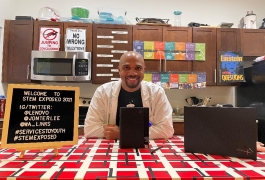Writing About Science for Nonscientists

There will come a time in your career when you have to explain a science concept or issue to a nonscientist. You may be responding to an article a friend or family member posts about vaccines. You may need to write a letter to your congressperson supporting funding for basic research. Or you might be invited to write an article about climate change for your school newspaper.
You may even find yourself having to write about your scientific experiences to a human resources manager responsible for a job you are applying for. One way or another, you will have to write to the level of the audience. And you will need to write in a way that allows them to grasp technical concepts, have reason to care, be motivated to take action, or feel confident about passing on information.
Although breaking down scientific information is not easy, it can be done. We have some tips that will make your writing impactful and understandable.
Know your purpose
Whether you’re trying to convince a funding agency that your work has great potential, persuade the public to trust your vaccine, or give insight into a scientific phenomenon for a reporter, you must be certain of your purpose before you put pen to paper (or fingers to keyboard). In all likelihood, you will be aiming to get your readers to learn something, take action, gain or change a perspective, or know your worth as a scientist. Knowing your purpose before you even write your first sentence is imperative to make sure you adequately address the request, and it will help keep your writing focused.
Know your audience
Writing from the perspective of the reader is critical to effective communication. Whatever the situation might be, make sure you are tapping into your audience and their perspective. Let’s explore an example.
Suppose your research is a computational analysis of the warming potentials of fluorinated methyl species in the atmosphere, and you are applying for your first job. Here are some things to consider:
- Who is your audience? What is their level of expertise? What might they already know?
It is important to assess their understanding. If you’re addressing a representative in human resources, you can expect them to have very little science knowledge. Depending on the position, a hiring manager might have a chemistry Ph.D., but they may not be familiar with your particular field.
Radiative forcing, Eckart potential function, and B3LYP vs. CBS-RAD methods may mean absolutely nothing to your reader. So if you dive right into the technical jargon and global warming potential calculations, you may lose them from the get-go. Hence, you need to elaborate with clarity and brevity to paint a clear picture for them.
To break things down using less complex terms, you can start with the basic contributions of methane derivatives to atmospheric warming, then describe your methodology and findings in basic terms. For human resources personnel who typically have little science background, you will have to keep the explanation even more simple. You may find that you have to redefine or take an even simpler approach to your writing to make the information understandable.
- What misconceptions might they have?
The audience may believe that you are an expert in handling hydrocarbon gases (instead of skilled with quantum analysis), that your work was too specialized to apply to the current position, or even (less likely) that climate change is a hoax. Anticipating misconceptions will allow you to clarify them before the reader has time to bring them to your attention.
- What is their perspective on cultural and/or social implications associated with the topic?
Be cognizant of the fact that your reader may have strong social, cultural, or even religious beliefs regarding your topic. If you’re applying for a job at a petrochemical company, your audience has probably been bombarded with reports about their company’s contribution to climate change. In this case, keep your tone objective and focus on how your skills can help them increase their yields and decrease the cost of managing their waste.
Research has shown that confronting humans with facts often does little to change their minds, especially regarding complex issues, such as climate change, vaccines, and genetic engineering. Taking sensitivities to methodologies seriously and writing with those sensitivities in mind will elevate your readers’ trust in the science you are presenting.
Side note: In a more public conversation, such as a Twitter exchange, you may find yourself combating trolls and misinformation. Responding calmly with correct information is the most helpful and responsible thing you can do as a scientist. Even if you don't change the minds of people on the other side of your argument, you are still contributing accurate information to others seeking facts. See the ACS Climate Science Toolkit for more information and resources.
- What questions will they have? As you are writing, if you come up with a question regarding your own research or topic of discussion, then it is safe to assume your reader will too. If possible, revise the text. If there is no way to revise the text to something clear, concise, and still accurate, you can say something like, “I look forward to discussing this in person.” If it is a question that only more research can answer, you can say that too. Either way, be prepared to answer the question.
- What do I want to happen if someone other than my intended audience sees this? In a few cases, your writing may fall into the hands of an unintended reader, such as a potential colleague or other hiring manager. You should be prepared for this to happen. You want to write with the assumption that others will read your words without taking offense or misunderstanding your intentions. Therefore, you want to be clear and explain things well.
Companies take great care in protecting confidential information, but it is still possible that anything you write could turn up in the hands of a competitor. In a public forum, you are almost guaranteed to run into someone who disagrees with you. Be aware of this and ensure none of your written comments can be misconstrued or twisted if taken out of context.
Get the audience to care
How does this information impact individuals? The world? The environment? Health? You must always ask: What’s in it for the reader? For example, if you tell the reader that you discovered how to efficiently access a compound with green (as in environmentally friendly) reagents and a quick reaction time, that’s great! But why should they care?
Well, for one thing, maybe less hazardous waste means a safer atmosphere or hydrosphere, which constitutes the air they breathe and the waters of aquatic life. Or, your newly discovered compound may be a pharmaceutical entity that could be the key to some chronic disease. So tell them that.
Don’t get so caught up in the number crunching, chemical mechanisms, and graphs. There is always a driving force behind research. You need to dive into the “why.”
Make it accessible
Translate. Break down. Translate again. Break down even more. It bears repeating that when you are addressing an audience with limited background knowledge in your area of expertise or science in general, technical jargon not only confuses your reader but makes them less interested, and therefore much less likely to get your takeaway message. There are several strategies to make your work more transparent.
- Vocabulary. Take, for example, this sentence: “Ritalin is an NDRI and psychostimulant that blocks dopamine transporters, rendering enhanced neurotransmission in the synaptic cleft and enhanced basal activity.” The information may come across as meaningless to your reader.
Here’s how you might revise the statement to make the information easy to understand: “Ritalin is a medication that increases neurotransmitter activity in the brain, resulting in increased alertness and attention in the patient.”
- Figurative language. Lessons from your English courses will come in handy when writing for a nontechnical audience. You can use similes and metaphors to help people better visualize and understand concepts. Analogies are extremely useful in writing because they help the reader make connections with knowledge they’ve already acquired. For example, you can write, “the electrons in the p orbital circulate around the nucleus of the atom, creating a shape like a figure 8 or a dumbbell” to illustrate what the p orbital looks like. Comparative language can help make abstract concepts more tangible to audiences.
- Visual aids. You need to show as you tell your science. Utilizing images and diagrams can make your topic more tangible. Also, graphs and charts allow you to organize information and effectively convey quantitative information. They say that a picture is worth a thousand words. You can convey so much more through the use of visual aids. It also makes your writing more interesting because you can break up large bodies of text with something that is visually engaging.
Make it compelling
One of the best ways to draw in an audience is to tell a story. In science, you have a story to tell because you have a beginning (a problem or question), a middle (the methodology and approach), and an ending (results and future directions). Writing in a more informal way using a conversational tone can convey meaning with more impact. You can even inject fun and humor, if you are writing for a casual audience.
Suppose your reader needs to know how an antibiotic works. You can talk about the discovery of penicillin (quite interesting, because it was by pure serendipity!) and then discuss how it works in a step-by-step manner. Let’s face it, who doesn’t love a good story? If you can get readers to care and actively listen to what you have to say, you’re one step closer to fulfilling your purpose.
What are you waiting for? Go write! The world is waiting to hear your story.
Writing Tips
Find your space. Writers often have a special space where they retreat to unleash their creative energies. This may be a desk, the library, a park, or a reading nook. Or if you’re Barack Obama writing a memoir, a tropical destination. Find a quiet place where you are comfortable and where you can think.
Take a break. Writing is a recursive process. Your first draft is rarely your final draft. Your piece is a work in progress. Walking away and coming back later in the day, or perhaps the next week, can make a world of difference. You’ll see things that you didn’t notice at first glance. You’ll have the chance to refine your language and add in little nuances to clarify your points. You may even get some inspiration during the time you walked away and use that to build upon your content. Keep coming back to your work with a fresh set of eyes. It’s not going anywhere. So take a break and come back often.
Outline. Beginning with an outline will get you off to a great start. Break down your writing project into parts. Then break down each part into different ideas. By establishing a logical sequence for your work, the chances of you getting “lost in the sauce” are vastly reduced. This simple step will help you get words on paper.
Where to start? Despite what you may think, many writers don’t start at the beginning of their piece. Instead, they choose to start wherever they feel most compelled, and where they can be most productive. If you can’t think of an opening line, skip it and go back to it. You don’t have to write from beginning to end.
Get feedback. Share your writing with someone you know who doesn’t have a science background. See if they can understand it and reword the main points before you present your work to your intended audience.
Practice makes perfect: Develop your skills. Three things you can do to improve your writing:
- Take some technical writing courses at your institution. These courses can nurture your communication skills and teach you how to tailor your writing to a particular audience, purpose, and context. Technical Writing, Public Speaking, Science Writing, Medical Writing, and Workplace Writing are good options.
- Read, read, read. I once heard that you cannot be a competent writer without being a competent reader. The more you read, the better grasp you’ll have of a particular genre. You’ll also begin to develop a better command of language over time.
- Science communication training programs. There are workshops and training programs that you can take advantage of through ACS at technical meetings, professional education courses, the outreach training program, and the chemistry advocacy workshop. You can also look into opportunities at your school or into organizations such as COMPASS.




